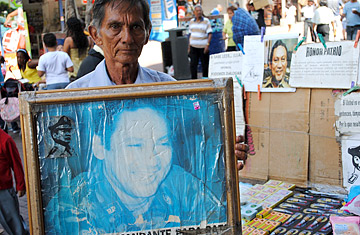
Noriega supporter Andres Gonzalez, 73, keeps a public shrine to the man he still calls "my comandante."
For the past 20 years, street vendor Andres Gonzalez, 73, has kept a public shrine to Gen. Manuel Antonio Noriega, waiting for the day his comandante returns to Panama. Though most passersby don't seem to share Gonzalez's nostalgia, the possibility of Noriega's return — if a French court heeds the Panamanian government's appeal — is giving this modernizing country an unwelcome blast from its banana-republic past.
For a country that now wears a suit and tie and wants to be taken seriously as a first-world player, Noriega has become an uncomfortable reminder of Panama's brutish, olive-drab past. Even though Noriega is 76 and convalescing after suffering two strokes in prison, some Panamanians still worry that the general could run the show again if brought back to the country. "A lot of Noriega's people are camouflaged in positions of power, waiting for him to return and give the order," says 42-year-old taxi driver Rafael Palma. He worries that the current government is weak and warns, "Noriega specializes in coups."
Like many Panamanians his age, Palma said he remembers the U.S. invasion "as if it were yesterday." He says the fact the U.S. was willing to "use all that force just to get one man," while sacrificing untold hundreds of civilian lives in the process, shows the kind of power Noriega had.
Panamanian attorney Julio Berrio also thinks Panama's political elite is still uneasy with the idea of Noriega's return. "Neither of the past two Panamanian governments have wanted Gen. Noriega back in Panamanian territory for fear that it would have some sort of repercussion on the country," Berrio says. Nevertheless, he has been involved in legal efforts to repatriate Noriega since U.S. troops nabbed him following their clumsy invasion in 1989. "I think the French tribunals are more objective, independent and adherent to the law, and will not be submitted to the same pressures that U.S. judges were," Berrio said this week, following Noriega's surprise April 26 extradition to France. Noriega faces a 10-year sentence for money laundering in France, but Berrio insists the general should be repatriated to face murder charges in Panama.
Berrio thinks he'll have a better chance of appealing to international law now that Noriega is in French custody. He says previous attempts to extradite his client from the U.S., where the former-CIA asset was jailed for 20 years after being convicted on charges of drug trafficking, racketeering and money laundering, were blocked by political pressures and a disregard for international law.
Noriega is scheduled to go before French judges May 12 to learn his fate. "Sooner or later, if God allows General Noriega to continue living, he will return to his country to face charges here," Berrio said. Panamanian President Ricardo Martinelli said on Wednesday that his government will request Noriega's extradition. Under Panamanian law, the ailing general's pending jail sentence would be commuted to house arrest due to age. Berrio says that though there is nervousness about a possible Noriega return, fear is unwarranted. "Noriega represents no danger to anyone," the lawyer says.
Those who knew the general best agree there'll be no more strong-manning in Noriega's future. "Noriega has no political infrastructure here; there's no one behind him anymore," said José I. Blandon, who served as Noriega's top political adviser in the 1980s before testifying against him in front of a U.S. Senate investigative subcommittee in 2001. Blandon said Noriega's possible return to Panama would not be cause for any "political trauma." Indeed, ever since the 1989 invasion, Blandon says, "Noriega has caused more political controversy in the U.S. than in Panama" since it was Uncle Sam who was "left holding the hot potato."Plus, Blandon says, Panama has changed so much over the past 20 years that Noriega probably wouldn't recognize the place, and the feeling would be mutual. "If he returns, he'll be met mostly with indifference," Blandon told TIME, noting that many Panamanians are too young to even remember the 1980s. "Even his extradition to France hasn't been cause for controversy in Panama," the analyst said.
Yet, at the makeshift shrine to Noriega set up on the pedestrian walkway several blocks from the poor working class neighborhood that was burned to the ground during the U.S. invasion, Gonzalez envisions a grand homecoming fitting for his general. And just the thought of Noriega's return has the street vendor thinking about merchandising possibilities. "Once the general comes back, we'll have t-shirts made with his picture on it."
